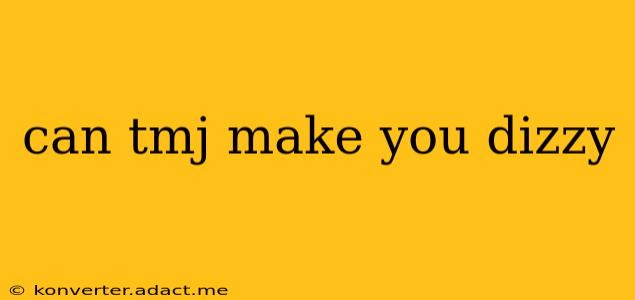Temporomandibular joint disorder (TMJ) is a common condition affecting the jaw joint, causing pain and discomfort. However, many sufferers experience a less discussed symptom: dizziness. This article explores the connection between TMJ and dizziness, answering common questions and providing valuable information for those experiencing both.
What is TMJ?
TMJ refers to problems with the temporomandibular joint, which connects your jaw to your skull. These problems can stem from various factors, including:
- Muscle disorders: Overuse or strain of the jaw muscles (masseter, temporalis, etc.)
- Joint problems: Dislocation, inflammation, or degenerative changes in the joint itself.
- Structural issues: Misalignment of the jaw, teeth grinding (bruxism), or clenching.
Symptoms are varied, but commonly include jaw pain, clicking or popping in the jaw, headaches, and limited jaw movement. The addition of dizziness can significantly impact a person's quality of life.
How Can TMJ Cause Dizziness?
The link between TMJ and dizziness isn't always straightforward. While not a direct cause-and-effect relationship in all cases, several mechanisms can explain the association:
- Inner Ear Connection: The temporomandibular joint is anatomically close to the inner ear. Muscle tension or inflammation in the jaw muscles can potentially affect the delicate structures of the inner ear, contributing to vertigo or dizziness. This is believed to be mediated through shared nerves and blood vessels.
- Cervical Spine Involvement: TMJ problems frequently coexist with neck pain and dysfunction (cervicogenic dizziness). Muscle tension extending from the jaw to the neck can affect the upper cervical spine, disrupting the proprioceptive input (sense of body position) and potentially leading to dizziness.
- Stress and Anxiety: TMJ is often exacerbated by stress and anxiety. These factors can also independently contribute to dizziness and feelings of lightheadedness. The interplay between TMJ pain, stress, and dizziness can create a challenging cycle.
Can TMJ Dizziness Be Severe?
The severity of dizziness associated with TMJ varies greatly. Some individuals experience mild, occasional lightheadedness, while others suffer from debilitating vertigo that significantly restricts their daily activities. The intensity of the dizziness is likely influenced by the underlying cause and severity of the TMJ disorder.
What Other Symptoms Accompany TMJ Dizziness?
Many individuals experiencing TMJ-related dizziness also report the following:
- Jaw Pain: This is the hallmark symptom of TMJ. Pain can range from mild discomfort to severe, throbbing agony.
- Headaches: Frequent headaches, often tension headaches or migraines, commonly accompany TMJ.
- Earaches: Pain in the ear is another common associated symptom.
- Neck Pain: As mentioned, neck pain and stiffness are often intertwined with TMJ.
- Difficulty Opening the Mouth: This can range from slight restriction to complete locking of the jaw.
- Ringing in the Ears (Tinnitus): A high-pitched ringing or buzzing sensation in the ears.
How is TMJ-Related Dizziness Diagnosed?
Diagnosing TMJ-related dizziness requires a thorough evaluation by a healthcare professional, typically a dentist specializing in TMJ disorders, an ENT specialist, or a neurologist. The diagnostic process may involve:
- Physical Examination: A detailed examination of the jaw joint, neck, and ears.
- Imaging Tests: X-rays or MRI scans may be used to visualize the joint structure and rule out other conditions.
- Neurological Examination: To assess balance, coordination, and rule out other neurological causes.
- Review of Symptoms: A complete medical history, including a detailed account of the dizziness and associated symptoms.
It is crucial to rule out other potential causes of dizziness, such as inner ear infections, vestibular disorders, or neurological conditions.
What are the Treatment Options for TMJ Dizziness?
Treatment for TMJ-related dizziness typically focuses on managing both the TMJ disorder and the dizziness itself. Options may include:
- Pain Relief Medications: Over-the-counter pain relievers like ibuprofen or stronger prescription medications.
- Jaw Splints or Mouthguards: These devices help to stabilize the jaw and reduce muscle tension.
- Physical Therapy: Exercises and stretches designed to strengthen jaw muscles, improve jaw range of motion, and address neck pain.
- Lifestyle Changes: Stress management techniques, improved posture, and dietary modifications.
- Botox Injections: In some cases, Botox injections can help to reduce muscle spasms and pain.
- Vestibular Rehabilitation: If the dizziness stems from inner ear involvement, vestibular rehabilitation therapy can be beneficial.
Disclaimer: This information is for educational purposes only and should not be considered medical advice. Always consult with a healthcare professional for diagnosis and treatment of any medical condition.
